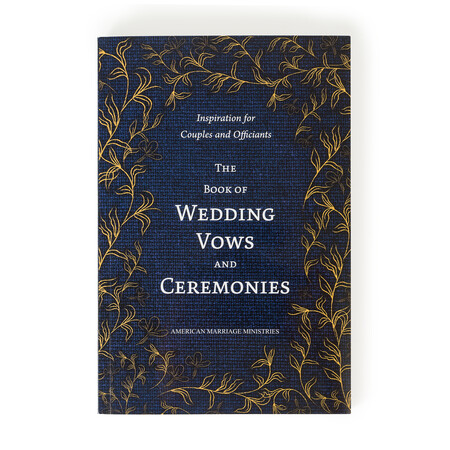Who can Solemnize Marriage in Wyoming
The law(s) below are the relevant statutes relating to who can solemnize marriage and officiant registration in Wyoming (where applicable).
§ 20-1-106Who May Solemnize Marriage; Form Of Ceremony.
(a) Every district or circuit court judge, district court commissioner, supreme court justice, magistrate and every licensed or ordained minister of the gospel, bishop, priest or rabbi, or other qualified person acting in accordance with the traditions or rites for the solemnization of marriage of any religion, denomination or religious society, may perform the ceremony of marriage in this state.
(b) In the solemnization of marriage no particular form is required, except that the parties shall solemnly declare in the presence of the person performing the ceremony and at least two (2) attending witnesses that they take each other as husband and wife.
C.L. 1876, ch. 81, §§ 8, 9; R.S. 1887, §§ 1548, 1549; R.S. 1899, §§ 2962, 2963; Laws 1907, ch. 37, § 1; C.S. 1910, §§ 3898, 3899; C.S. 1920, §§ 4962, 4963; Laws 1931, ch. 73, § 76; R.S. 1931, §§ 68-108, 68-109; C.S. 1945, §§ 50-110, 50-111; W.S. 1957, §§ 20-10, 20-11; Laws 1977, ch. 152, § 1; Rev. W.S. 1957, § 20-1-106; Laws 1999, ch. 79, § 1; 2000, ch. 24, § 4; 2004, ch. 42, § 1.
TAGS
solemnization of marriage
View Law
List of All 12 Wyoming Marriage Laws
Below you can read through our curated list of all Wyoming laws related to marriage, weddings, officiants, and marriage licenses. If it is in any way marriage related, you will find it here.
§ 20-1-109When Marriage Solemnized By Unauthorized Person Valid.
No marriage solemnized in any manner authorized by W.S. 20-1-106, shall be deemed or adjudged to be void, nor is the validity of the marriage in any way affected because of a lack of jurisdiction or authority of the person performing the ceremony of marriage if the marriage is consummated with a full belief on the part of the persons so married, or either of them, that the person performing the ceremony was lawfully authorized to do so.
C.L. 1876, ch. 81, § 14; R.S. 1887, § 1554; R.S. 1899, § 2968; C.S. 1910, § 3904; C.S. 1920, § 4968; R.S. 1931, § 68-114; C.S. 1945, § 50-115; W.S. 1957, § 20-16; Laws 1977, ch. 152, § 1; Rev. W.S. 1957, § 20-1-109; Laws 1999, ch. 79, § 1.
View Law
§ 20-1-101Marriage A Civil Contract.
Marriage is a civil contract between a male and a female person to which the consent of the parties capable of contracting is essential.
C.L. 1876, ch. 81, § 1; R.S. 1887, § 1541; R.S. 1899, § 2955; C.S. 1910, § 3891; C.S. 1920, § 4955; R.S. 1931, § 68-101; C.S. 1945, § 50-101; W.S. 1957, § 20-1; Laws 1977, ch. 152, § 1; Rev. W.S. 1957, § 20-1-101.
View Law
§ 20-1-106Who May Solemnize Marriage; Form Of Ceremony.
(a) Every district or circuit court judge, district court commissioner, supreme court justice, magistrate and every licensed or ordained minister of the gospel, bishop, priest or rabbi, or other qualified person acting in accordance with the traditions or rites for the solemnization of marriage of any religion, denomination or religious society, may perform the ceremony of marriage in this state.
(b) In the solemnization of marriage no particular form is required, except that the parties shall solemnly declare in the presence of the person performing the ceremony and at least two (2) attending witnesses that they take each other as husband and wife.
C.L. 1876, ch. 81, §§ 8, 9; R.S. 1887, §§ 1548, 1549; R.S. 1899, §§ 2962, 2963; Laws 1907, ch. 37, § 1; C.S. 1910, §§ 3898, 3899; C.S. 1920, §§ 4962, 4963; Laws 1931, ch. 73, § 76; R.S. 1931, §§ 68-108, 68-109; C.S. 1945, §§ 50-110, 50-111; W.S. 1957, §§ 20-10, 20-11; Laws 1977, ch. 152, § 1; Rev. W.S. 1957, § 20-1-106; Laws 1999, ch. 79, § 1; 2000, ch. 24, § 4; 2004, ch. 42, § 1.
TAGS
solemnization of marriage
View Law
§ 20-1-102Minimum Marriageable Age; Exception; Parental Consent.
20-1-102. Minimum marriageable age; exception;
parental consent.
(a) At the time of marriage the parties shall be at least eighteen (18) years of age except as otherwise provided. No person shall marry who is under the age of sixteen (16) years.
(b) All marriages involving a person sixteen (16) or seventeen (17) years of age are prohibited and voidable, unless before contracting the marriage a judge of a court of record in Wyoming approves the marriage and authorizes the county clerk to issue a license therefor. All marriages involving a person under sixteen (16) years of age are void.
(c) When either party is sixteen (16) or seventeen (17) years of age, no license shall be granted without the verbal consent, if present, and written consent, if absent, of the father, mother, guardian or person having the care and control of the person
sixteen (16) or seventeen (17) years of age. Written consent shall be proved by the testimony of at least one (1) competent witness.
(d) Notwithstanding the provisions of this section, parties may marry without the authorization of a judge of a court of record or the consent of any other person if both of the parties are not less than sixteen (16) years of age and if every party that is under eighteen (18) years of age meets the requirements for the right to contract under W.S. 14-1-102 or has received a declaration of emancipation pursuant to W.S. 14-1-203.
C.L. 1876, ch. 81, §§ 2, 5; R.S. 1887, §§ 1542, 1545; R.S. 1899, §§ 2956, 2959; C.S. 1910, §§ 3892, 3895; C.S. 1920, §§ 4956, 4959; R.S. 1931, §§ 68-102, 68-105; C.S. 1945, §§ 50-102, 50-105; W.S. 1957, §§ 20-2, 20-3; Laws 1975, ch. 4, § 1; ch. 61, § 1; Rev. W.S. 1957, § 20-2.1; Laws 1977, ch. 152, § 1; Rev. W.S. 1957, § 20-1-102.; Amended by HB0007 2023
View Law
§ 20-2-101Void And Voidable Marriages Defined; Annulments.
Void and voidable marriages defined; annulments. ::: (a) Marriages contracted in Wyoming are void without any decree of divorce:
(i) When either party has a husband or wife living at the time of contracting the marriage;
(ii) When either party is mentally incompetent at the time of contracting the marriage;
(iii) When the parties stand in the relation to each other of parent and child, grandparent and grandchild, brother and sister of half or whole blood, uncle and niece, aunt and nephew, or first cousins, whether either party is illegitimate. This paragraph does not apply to persons not related by consanguinity.
(iv) When either party is under sixteen (16) years of age at the time of contracting the marriage.
(b) A marriage is voidable if solemnized when either party was sixteen (16) or seventeen (17) years of age unless a judge gave consent, if they separated during nonage and did not cohabit together afterwards, or if the consent of one (1) of the parties was obtained by force or fraud and there was no subsequent voluntary cohabitation of the parties.
(c) Either party may file a petition in the district court of the county where the parties or one (1) of them reside, to annul a marriage for reasons stated in subsections (a) and (b) of this section and proceedings shall be held as in the case of a petition for divorce except as otherwise provided. Upon due proof the marriage shall be declared void by a decree of nullity.
(d) An action to annul a marriage on the ground that one of the parties was under the age of legal consent provided by W.S. 20-1-102(a) may be filed by the parent or guardian entitled to the custody of the minor. The marriage may not be annulled on the application of a party who was of the age of legal consent at the time of the marriage nor when it appears that the parties, after they had attained the age of consent, had freely cohabited as man and wife.
(e) An action to annul a marriage on the grounds of mental incompetency may be commenced on behalf of a mentally incompetent person by his guardian or next friend. A mentally incompetent person restored to competency may maintain an action of annulment, but no decree may be granted if the parties freely cohabited as husband and wife after restoration of competency.
(f) An action to annul a marriage on the grounds of physical incapacity may only be maintained by the injured party against the party whose incapacity is alleged and may only be commenced within two (2) years from the solemnization of the marriage.
(g) All decrees of annulment may include provisions for the custody and support of children pursuant to this article, W.S. 20-2-201 through 20-2-204 and 20-2-301 through 20-2-315 and for the division of property pursuant to W.S. 20-2-114.
Amended HB0007 2023
View Law
§ 20-1-105Judge May Order License Issued.
Judge may order license issued :::
(a) If any county clerk refuses to issue a license to marry, or in case of circumstances arising which would necessitate the waiver of any one (1) or more of the requirements of W.S. 20-1-102 and 20-1-103(b) and (c), either applicant for the license may apply to the district court of the county for the issuance of a license without compliance with one (1) or more of those requirements. If the judge finds that a license should be issued, or such circumstances exist that it is proper that any one (1) or more of the requirements should be waived, the judge may order in writing the issuance of the license. Upon the order of the judge being filed with the county clerk, the county clerk shall issue the license at the time specified in the order. No fee or court costs shall be charged or taxed for the order.
(b) If either party is sixteen (16) or seventeen (17) years of age, the parents or guardians may apply to any judge of a court of record in the county of residence of the person sixteen (16) or seventeen (17) years of age for an order authorizing the marriage and directing the issuance of a marriage license. If the judge believes it advisable, he shall enter an order authorizing the marriage and directing the county clerk to issue a license. Upon filing of a certified copy of the order with the county clerk, the county clerk shall issue a license and endorse thereon the fact of the issuance of the order. No person authorized to perform marriage ceremonies in Wyoming shall perform any marriage ceremony if either party is under the age of sixteen (16) years
(c) Before issuing the order provided by this section the judge may require affidavits or other proof of the competency of the parties or of any other facts necessitating or making the order advisable. The order may be in substantially the following form:
I , the undersigned , a judge of the court, a court of record in and for county, Wyoming, hereby order that a marriage license may issue to of (address) and of (address) on the day of (year) Date:
Laws 1975, ch. 61, § 1; W.S. 1957, §§ 20-8.1, 20-8.2; Laws 1977, ch. 152, § 1; Rev. W.S. 1957, § 20-1-105; Laws 1999, ch. 150, § 2; 2002 Sp. Sess., ch. 45, § 1.; Amended by HB0007 2023
View Law
§ 20-1-107Certificate Of Marriage.
(a) When a marriage is solemnized, the person performing the ceremony shall give one (1) of the parties a certificate under his hand and signed by the witnesses to the marriage, specifying the names, ages and place of residence of the parties married, the names and residences of at least two (2) witnesses who were present at the marriage, and the time and place thereof.
(b) The county clerk of each county in the state shall record all returns of marriages in a book kept for that purpose within one (1) month after receipt.
(c) The original certificate and record of marriage made by the person performing the ceremony and the record thereof or a certified copy of the certificate or record is admissible in all courts and places as presumptive evidence of the fact of the marriage.
C.L. 1876, ch. 81, §§ 10, 12, 16; R.S. 1887, §§ 1550, 1552, 1556; R.S. 1899, §§ 2964, 2966, 2970; C.S. 1910, §§ 3900, 3902, 3906; C.S. 1920, §§ 4964, 4966, 4970; Laws 1931, ch. 73, § 77; R.S. 1931, §§ 68-110, 68-112, 68-116; C.S. 1945, §§ 50-112, 50-113, 50-117; W.S. 1957, §§ 20-12 to 20-14; Laws 1977, ch. 152, § 1; Rev. W.S. 1957, § 20-1-107.
View Law
§ 20-1-108Offenses Relating To Marriage Generally.
If the county clerk neglects to record a marriage certificate, or if any person performs a marriage ceremony knowing that he is not legally authorized to do so or knowing of any legal impediment to the proposed marriage, he is guilty of a misdemeanor and shall be punished by a fine not exceeding five hundred dollars ($500.00) or imprisonment for not exceeding one (1) year.
C.L. 1876, ch. 81, § 13; R.S. 1887, § 1553; R.S. 1899, § 2967; C.S. 1910, § 3903; C.S. 1920, § 4967; R.S. 1931, § 68-113; C.S. 1945, § 50-114; W.S. 1957, § 20-15; Laws 1977, ch. 152, § 1; Rev. W.S. 1957, § 20-1-108.
View Law
(a) Before solemnization of any marriage in this state, a marriage license shall be obtained from a Wyoming county clerk.
(b) Application for a marriage license shall be made by one (1) of the parties to the marriage before the license is issued. Upon receipt of an application, the county clerk shall ascertain by the testimony of a competent witness and the applicant, the names, the social security numbers of the parties who have valid social security numbers, residences and ages of the parties and whether there is any legal impediment to the parties entering into the marriage contract according to the laws of the state of their residence. The clerk shall enter the facts ascertained in a book kept by him for that purpose, except for the social security numbers which shall be provided to the state office of vital records and not made a part of the county public record. He may issue a license to marry and shall date the license on the date of issuance except as otherwise provided.
(c) Unless there is an order to waive the requirements of this section by a judge of a court of record in the county pursuant to W.S. 20-1-105, the clerk shall refuse to issue a license if:
(i) Either of the parties is legally incompetent to enter into a marriage contract according to the law of this state; or
(ii) There is any legal impediment; or
(iii) Either party is sixteen (16) or seventeen (17) years of age and the consent of a parent or guardian has not been given except as provided in W.S. 20-1-102(d).
(d) A marriage license obtained from a Wyoming county clerk shall expire one (1) year from the date the license was issued if the parties have not solemnized the marriage. The expiration date shall be shown on the marriage license. Upon expiration of a marriage license, the parties shall apply for and obtain a new marriage license before solemnization of their marriage in this state.
C.L. 1876, ch. 81, §§ 4, 6, 7; R.S. 1887, §§ 1544, 1546, 1547; R.S. 1899, §§ 2958, 2960, 2961; Laws 1907, ch. 97, §§ 1, 2; C.S. 1910, §§ 3894, 3896, 3897; C.S. 1920, §§ 4958, 4960, 4961; Laws 1931, ch. 99, § 1; R.S. 1931, §§ 68-104, 68-106, 68-107; Laws 1935, ch. 3, § 1; 1945, ch. 144, § 1; C.S. 1945, §§ 50-104, 50-106, 50-107; W.S. 1957, §§ 20-4 to 20-6; Laws 1975, ch. 61, § 2; 1977, ch. 152, § 1; Rev. W.S. 1957, § 20-1-103; Laws 1997, ch. 193, § 2; 1998, ch. 90, § 1; 2009, ch. 40, § 1.; Amended by HB0007
View Law
§ 20-1-110Marriage Ceremony According To Rites And Customs Of Religious Societies Or Assemblies.
Any religious society or religious assembly may perform the ceremony of marriage in this state according to the rites and customs of the society or assembly. The clerk or keeper of the minutes, proceedings or other book of the society or assembly wherein the marriage occurs, or if none then the moderator or person presiding in the society or assembly, shall make out and transmit to the county clerk of the county a certificate of the marriage.
C.L. 1876, ch. 81, § 15; R.S. 1887, § 1555; R.S. 1899, § 2969; C.S. 1910, § 3905; C.S. 1920, § 4969; R.S. 1931, § 68-115; C.S. 1945, § 50-116; W.S. 1957, § 20-20; Laws 1967, ch. 108, § 1; 1977, ch. 152, § 1; Rev. W.S. 1957, § 20-1-110.
View Law
All marriage contracts which are valid by the laws of the country in which contracted are valid in this state.
C.L. 1876, ch. 81, § 17; R.S. 1887, § 1557; R.S. 1899, § 2971; C.S. 1910, § 3907; C.S. 1920, § 4971; R.S. 1931, § 68-117; C.S. 1945, § 50-118; W.S. 1957, § 20-21; Laws 1977, ch. 152, § 1; Rev. W.S. 1957, § 20-1-111.
View Law
§ 20-1-113Legitimacy Of Children Presumed.
The legitimacy of all children conceived or born during the marriage is rebuttably presumed pursuant to W.S. 14-2-504.
Laws 1882, ch. 40, § 22; R.S. 1887, § 1588; R.S. 1899, § 3005; C.S. 1910, § 3941; C.S. 1920, § 5007; R.S. 1931, § 35-125; C.S. 1945, § 3-5923; W.S. 1957, § 20-67; Laws 1977, ch. 152, § 1; Rev. W.S. 1957, § 20-2-117; W.S. 1977, § 20-2-117; Laws 2000, ch. 34, § 4; 2003, ch. 93, § 2.
View Law







